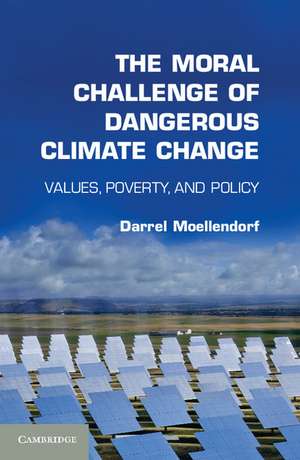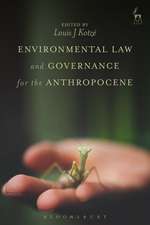The Moral Challenge of Dangerous Climate Change: Values, Poverty, and Policy
Autor Darrel Moellendorfen Limba Engleză Paperback – 6 apr 2014
| Toate formatele și edițiile | Preț | Express |
|---|---|---|
| Paperback (1) | 291.26 lei 6-8 săpt. | |
| Cambridge University Press – 6 apr 2014 | 291.26 lei 6-8 săpt. | |
| Hardback (1) | 531.48 lei 6-8 săpt. | |
| Cambridge University Press – 13 apr 2014 | 531.48 lei 6-8 săpt. |
Preț: 291.26 lei
Nou
Puncte Express: 437
Preț estimativ în valută:
55.73€ • 58.46$ • 46.40£
55.73€ • 58.46$ • 46.40£
Carte tipărită la comandă
Livrare economică 01-15 aprilie
Preluare comenzi: 021 569.72.76
Specificații
ISBN-13: 9781107678507
ISBN-10: 1107678501
Pagini: 273
Ilustrații: 3 b/w illus. 1 table
Dimensiuni: 150 x 226 x 28 mm
Greutate: 0.39 kg
Editura: Cambridge University Press
Colecția Cambridge University Press
Locul publicării:New York, United States
ISBN-10: 1107678501
Pagini: 273
Ilustrații: 3 b/w illus. 1 table
Dimensiuni: 150 x 226 x 28 mm
Greutate: 0.39 kg
Editura: Cambridge University Press
Colecția Cambridge University Press
Locul publicării:New York, United States
Cuprins
1. Danger, poverty, and human dignity; 2. The value of biodiversity; 3. Risks, uncertainties, and precaution; 4. Discounting and the future and the morality in climate change economics; 5. The right to sustainable development; 6. Responsibility and climate change policy; 7. Urgency and policy; Afterword. Frankenstorms; Appendix 1. The anti-poverty principle and the non-identity problem; Appendix 2. Climate change and the human rights of future persons: assessing four philosophical challenges.
Recenzii
'This book is a penetrating and comprehensive first effort to tackle a largely unacknowledged but supremely important moral dilemma. It is a unique contribution to advancing the literature on climate change and shows the importance of our necessary initiatives to exit the fossil fuel regime by raising prices to decrease demand and to create a direct threat to the only source of energy now affordable to many of the world's poorest struggling for sustainable development.' Henry Shue, Centre for International Studies, University of Oxford
'Darrel Moellendorf's book is a valuable, second-generation contribution to the literature on the normative implications of anthropogenic climate change. It brings together a great many issues that must be addressed in connection with climate change. Among others, it addresses the issues of normative principles and frameworks and of impacts to the non-human world, technical questions about risk and uncertainty and discounting future impacts, the distribution of mitigation costs, and the appropriateness of strategies other than mitigation.' Kendy M. Hess, Notre Dame Philosophical Reviews
'This book provides a timely challenge to current trends in decision making frameworks for climate change policies … The text provides an argumentative arsenal for the case that the sense of 'urgency' related to climate change does not automatically justify reduced consideration of moral starting points, but rather, such moral perspectives may be the most practical means of determining what we can and cannot do in relation to future climate change policies.' Phil Johnstone, Journal of International Development
'Darrel Moellendorf's book is a valuable, second-generation contribution to the literature on the normative implications of anthropogenic climate change. It brings together a great many issues that must be addressed in connection with climate change. Among others, it addresses the issues of normative principles and frameworks and of impacts to the non-human world, technical questions about risk and uncertainty and discounting future impacts, the distribution of mitigation costs, and the appropriateness of strategies other than mitigation.' Kendy M. Hess, Notre Dame Philosophical Reviews
'This book provides a timely challenge to current trends in decision making frameworks for climate change policies … The text provides an argumentative arsenal for the case that the sense of 'urgency' related to climate change does not automatically justify reduced consideration of moral starting points, but rather, such moral perspectives may be the most practical means of determining what we can and cannot do in relation to future climate change policies.' Phil Johnstone, Journal of International Development
Descriere
This book examines the threat that climate change poses to the projects of poverty eradication, sustainable development, and biodiversity preservation.













